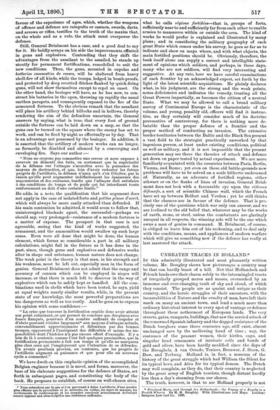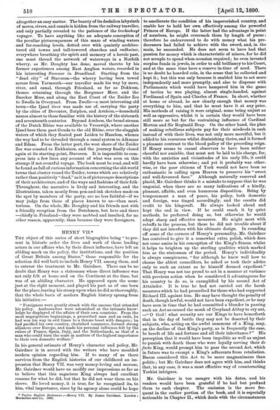UNBEATEN TRACKS IN HOLLAND.*
Is this admirably illustrated and most pleasantly written volume, Mr. Doughty shows how picturesque a country may be that can hardly boast of a hill. Not that Hollandsch and Friesch lands owe their charm solely to the intermingled tracts of irregularly grouped meres and moors, overarched by an immense and ever-changing vault of sky and cloud, of which they consist. The people are as quaint and unique as their country, and the heroic struggles of their ancestors, with the inexorabilities of Nature and the cruelty of man, have left their mark on many an ancient town, and lend a much more than ordinary historical interest to every spot of vantage or defence throughout these nethermost of European lands. The very streets, gates, ramparts, buildings, that saw the serried attack of the renowned Spanish infantry and the dogged resistance of the Dutch burghers some three centuries ago, still exist, almost unchanged save by the mellowing hand of time ; nay, the costumes of the peasant women, their kirtles, caps, and singular head ornaments of intricate coils and bands of gold and silver, have been hardly modified since the days of the Breughels, A van Ostade, Teniers, Brouwer, J. Steen, G. Dow, and Terburg. Holland is, in fact, a museum of the history of the great struggle which had William the Silent for
its typical hero, and Alva fOr its typical demon. The Dutch may well complain, as they do, that their country is neglected by the great army of English tourists, though distant hardly less than a day's steaming from our shores.
The truth, however, is that to see Holland properly is not
• Friesland Meru, and through the Netherlands; the Voyage of a FantRy in a Norfolk Wherry By H. EL Doughty. With Illustrations and Yaps. London: Sampson Low and Co. 1889.
altogether an easy matter. The beauty of its dindalion labyrinth of meres, rivers, and canals is hidden from the railway traveller, and only partially revealed to the patience of the treckschuyt voyager. To have anything like an adequate conception of the peculiar picturesqueness of this maze of winding waters and far-reaching levels, dotted over with quaintly architec- tared old towns and tall-towered churches and radhuiser, everywhere breathing the spirit and memory of a heroic past, one must thread the network of waterways in a Norfolk wherry, as Mr. Doughty has done, moved thereto by his former experiences among East Anglian waters, recorded in his interesting Summer in Broaclland. Starting from the "dead city" of Stavoren—the wherry having been towed across from Yarmouth—our traveller made his way by mere, river, and canal, through Friesland, as far as Dokkum, thence returning through the Bergumer Meer, and the Snecker Meer, and along the East Coast of the Zuider Zee to Zwolle in Overyssel. From Zwolle—a most interesting old town—the Ijssel river was made use of, carrying the party by the cities of Deventer, Zutphen, and Arnhem,—household names almost to those familiar with the history of the sixteenth and seventeenth centuries. Beyond Arnhem, the broad stream of the Dutch Rhine was available to Vreeswijk, where another Ijssel bore them past Gouda to the old Rhine, over the sluggish waters of which they floated past Leiden to Haarlem, whence the way had to be threaded through a canal system to Alkmaar and Edam. From the latter port, the west shore of the Zuider Zee was coasted to Enkhuizen, and the journey finally closed again at its starting-point, Stavoren. It is impossible to com- press into a few lines any a,cconnt of what was seen on this strange if not eventful voyage. The book must be read, and will be found as full of curious information concerning the old-world towns that cluster round the Zuider, towns which are relatively rather than positively "dead," as it is of picturesque descriptions of their architecture, and of the ways and fashions of their folk. Throughout, the narrative is lively and interesting, and the illustrations, taken mostly from pen-and-ink sketches made on the spot by members of the party, are no less faithful—if we may judge from those of places known to us—than meri- torious. On the whole, Mr. Doughty and his friends met with a friendly reception from the Dutchmen, but here and there —chiefly in Friesland—they were mobbed and insulted, for no other reason, apparently, than because they were foreigners.



































 Previous page
Previous page